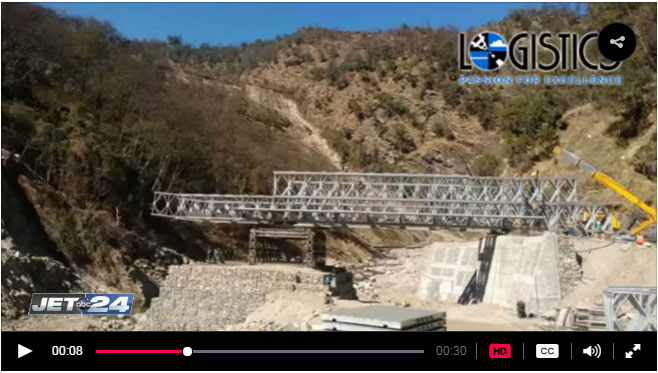
by logisticsplus | Apr 7, 2016 | News
WJET TV (ABC) recently aired a short clip regarding our recent India bridge logistics project. Click image below to watch the video online.

Global Trade Magazine recently published and article titled “When to consider chartering your own air cargo carrier.” Logistics Plus international manager, Abi Lopez Kuzma, was interviewed for, and cited within, the final article. Click the image below to read the article online.
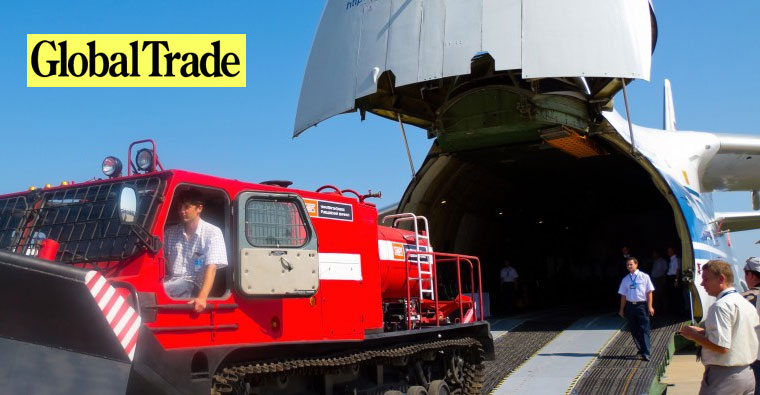
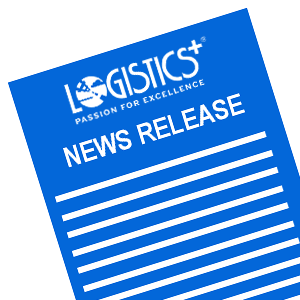
by logisticsplus | Apr 6, 2016 | News
FOR IMMEDIATE RELEASE
Bridge-Building Logistics in the Himalayan Mountains of Northern India
Logistics Plus India Provides Logistics Support for New Bridge Between Sonprayag and Gaurikund
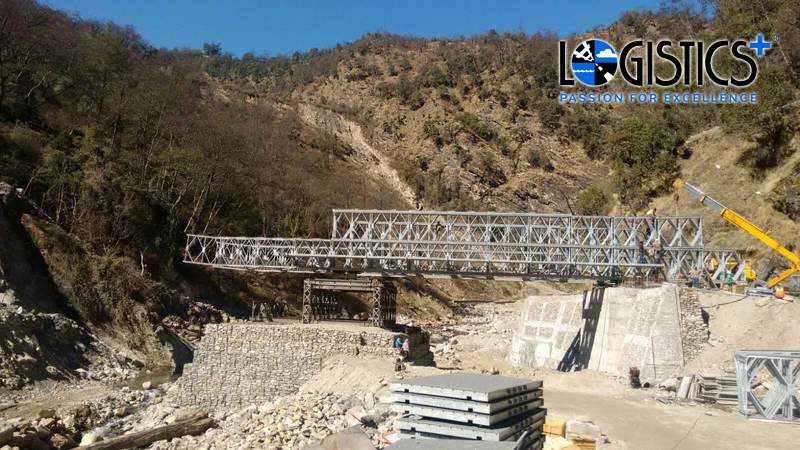 ERIE, Pa. (April 6, 2016) – Logistics Plus Inc., a worldwide provider of transportation, logistics and supply chain solutions, reports that its India Division (aka, “LP India”) played a major role in coordinating logistics for the successful completion of an important bridge in the Himalayan mountains of northern India between the cities of Sonprayag and Gaurikund. The bridge, constructed across Mandakini River, was completed in the record time of 30 days thanks, in part, to the logistical support LP India provided to the overall construction project.
ERIE, Pa. (April 6, 2016) – Logistics Plus Inc., a worldwide provider of transportation, logistics and supply chain solutions, reports that its India Division (aka, “LP India”) played a major role in coordinating logistics for the successful completion of an important bridge in the Himalayan mountains of northern India between the cities of Sonprayag and Gaurikund. The bridge, constructed across Mandakini River, was completed in the record time of 30 days thanks, in part, to the logistical support LP India provided to the overall construction project.
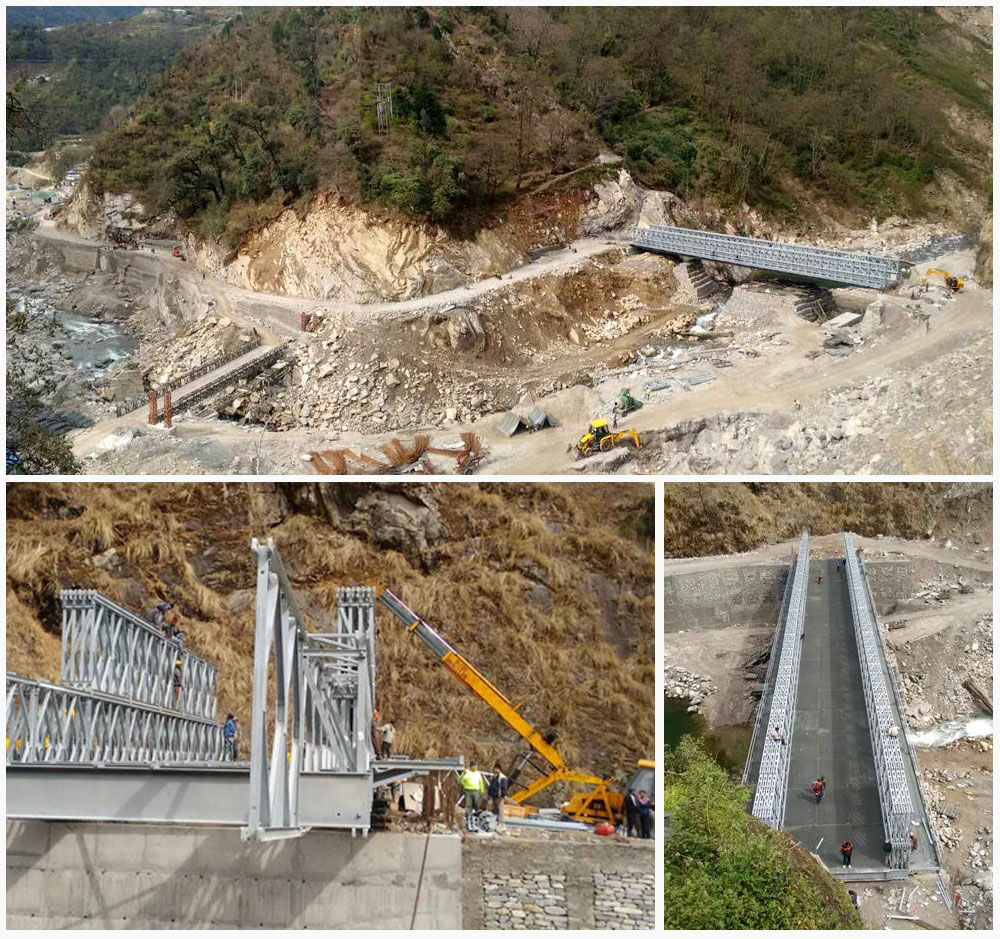 The previous bridge had washed away twice within the past three years due to unprecedented flooding that began back in 2013. The new, more permanent bridge was sourced and shipped from a New Jersey, USA bridge builder. The bridge parts moved by container ship to Bombay, and then by train to New Delhi, and then by road to Rishikesh on container lorries. Transshipment by smaller trucks was required for the last leg to Sonprayag. In all, it was a mind boggling logistics exercise carried out to military precision by the LP India team.
The previous bridge had washed away twice within the past three years due to unprecedented flooding that began back in 2013. The new, more permanent bridge was sourced and shipped from a New Jersey, USA bridge builder. The bridge parts moved by container ship to Bombay, and then by train to New Delhi, and then by road to Rishikesh on container lorries. Transshipment by smaller trucks was required for the last leg to Sonprayag. In all, it was a mind boggling logistics exercise carried out to military precision by the LP India team.
“The site for the bridge posed many challenges,” said Sundreysh Sarup, managing director for LP India. “The history of floods demanded elaborate logistical planning and execution. The logistics of transporting a bridge to Sonprayag 250 kilometers from Rishikesh was no simple matter. It took significant planning and great coordination to ensure all of the equipment and parts arrived to the job site on time and intact. I am very pleased the project was a success, which will most certainly give a boost to commercial activity within the region.”
Learn more about LP India at www.logisticsplus.com/IndiaLogistics
About Logistics Plus Inc.
Logistics Plus Inc. provides freight transportation, warehousing, global logistics, and supply chain management solutions through a worldwide network of talented and caring professionals. Founded in Erie, PA by local entrepreneur, Jim Berlin, 20 years ago, Logistics Plus has been repeatedly recognized as one of the fastest-growing transportation and logistics companies in the country. With a strong passion for excellence, its 350+ employees put the “Plus” in logistics by doing the big things properly, and the countless little things, that together ensure complete customer satisfaction and success.
The Logistics Plus® network includes offices located in Erie, PA; Alma, AR; Little Rock, AR; Los Angeles, CA; Riverside, CA; San Francisco, CA; Visalia, CA; Atlanta, GA; Evansville, IN; Detroit, MI; Kansas City, MO; Charlotte, NC; Lexington, NC; Buffalo, NY; Cleveland, OH; Charleston, SC; Greenville, SC; Nashville, TN; Dallas, TX; Fort Worth, TX; Houston, TX; Laredo, TX; Bahrain; Belgium; Canada; Chile; China; Colombia; Egypt; France; Germany; India; Indonesia; Kazakhstan; Libya; Mexico; Poland; Saudi Arabia; Turkey; and UAE; with additional agents around the world. For more information, visit www.logisticsplus.com or follow @LogisticsPlus on Twitter.
Media Contact:
Scott G. Frederick
Vice President, Marketing
Logistics Plus Inc.
(814) 240-6881
scott.frederick@logisticsplus.com
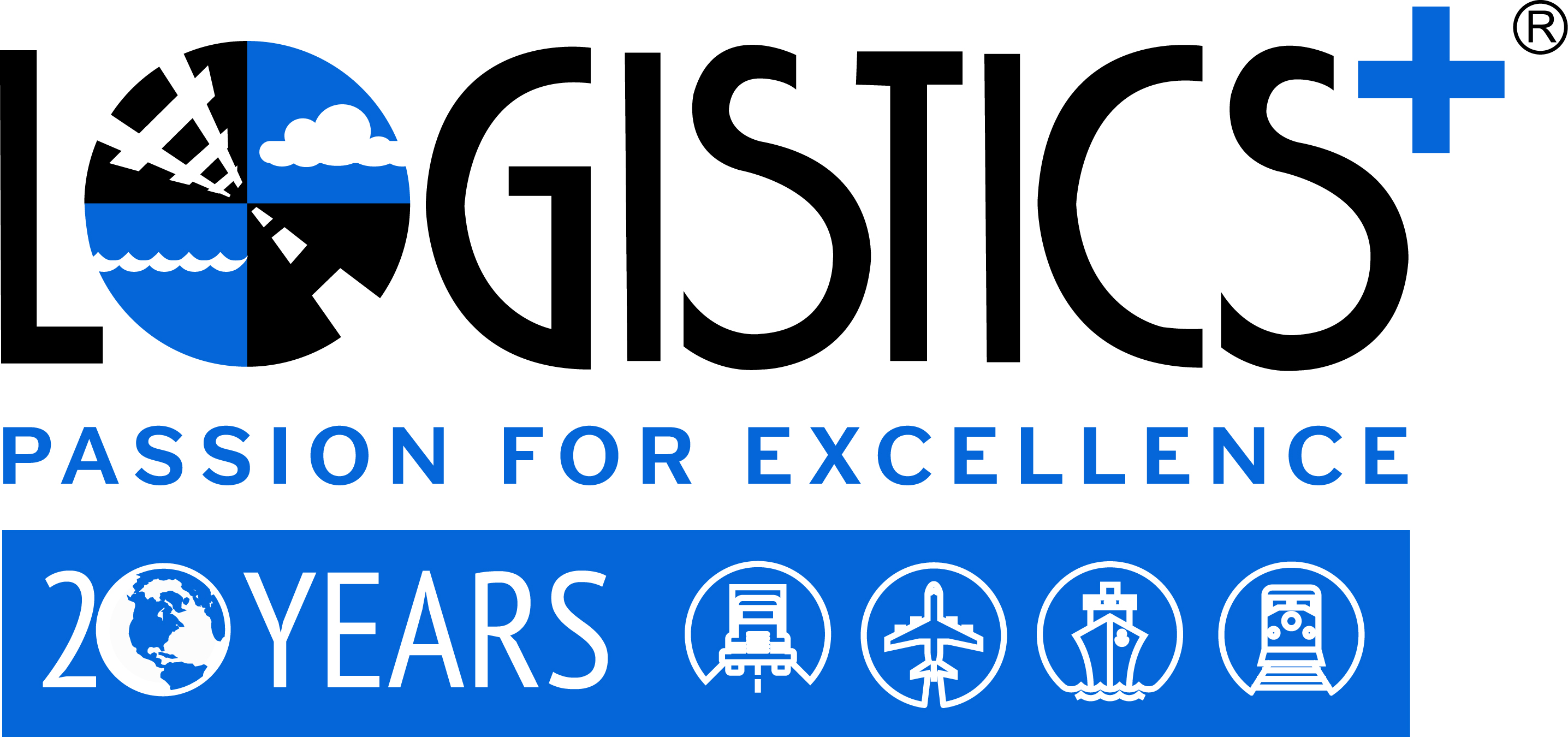
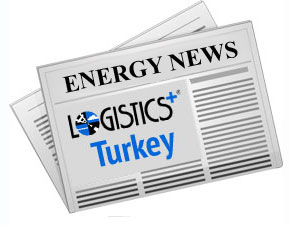
by logisticsplus | Apr 5, 2016 | News
Energy News from around the World
 Today Logistics Plus Turkey sent its March 2016 issue of LP Turkey Energy News to customers and other interested parties throughout the region. Logistics Plus has extensive expertise providing transportation and logistics solutions to companies in the Energy & Fuel Industry.
Today Logistics Plus Turkey sent its March 2016 issue of LP Turkey Energy News to customers and other interested parties throughout the region. Logistics Plus has extensive expertise providing transportation and logistics solutions to companies in the Energy & Fuel Industry.
The new issue is pictured below. Click here to read the online version.

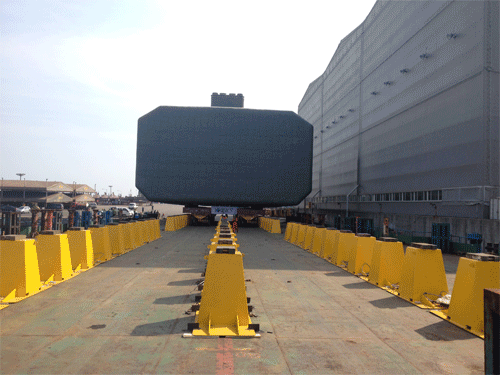
by logisticsplus | Apr 4, 2016 | News
 Logistics Plus global project manager, Frederik Geirnaert, recently shared another snippet regarding a large, project cargo shipment that he and the Logistics Plus Belgium team are coordinating. After months of intensive preparation and transport engineering, four (4) empty gas tanks were transferred by barge from their storage location to the load out terminal in Ulsan, South Korea. This is the first step in a move that will see these tanks being loaded to a heavy-lift vessel later this month for shipment to Portland, Oregon in the USA.
Logistics Plus global project manager, Frederik Geirnaert, recently shared another snippet regarding a large, project cargo shipment that he and the Logistics Plus Belgium team are coordinating. After months of intensive preparation and transport engineering, four (4) empty gas tanks were transferred by barge from their storage location to the load out terminal in Ulsan, South Korea. This is the first step in a move that will see these tanks being loaded to a heavy-lift vessel later this month for shipment to Portland, Oregon in the USA.
What makes this move quite special is, of course, the size and weight of the tanks. Each tank is about 95 feet long (29 meters), 75 feet wide (23 meters) and 53 feet high (16 meters); and each tank weighs 2,235,500 pounds (1,014 metric tons)! Now that’s a big shipment!
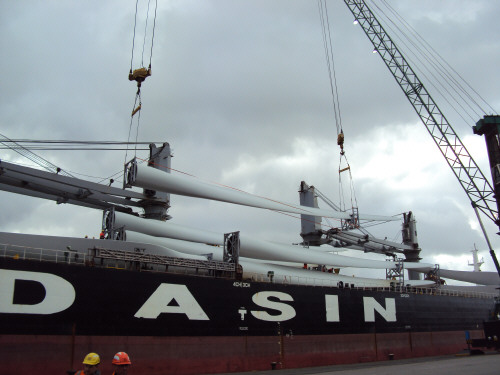
by logisticsplus | Mar 30, 2016 | News
Logistics Plus continues to support the energy industry by handling big and unique logistics projects for wind, solar, oil and gas companies around the world. The Logistics Plus Belgium office recently coordinated an ocean move of windmill blades from Tianjin, China to the Port of Antwerp in Belgium. This past weekend they unloaded the 18 windmill blades, each measuring 40 meters in length, and transferred them to trucks where they will be ground transported to their final destination in the Netherlands.
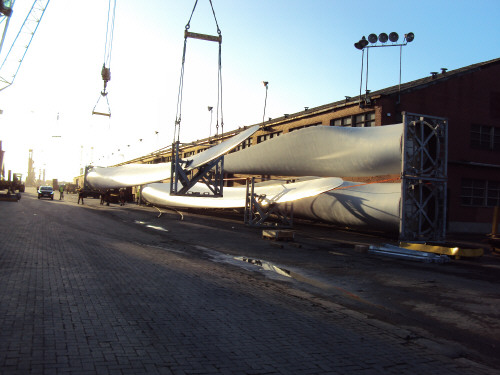

Need help with your big, unique or heavy-lift project cargo?

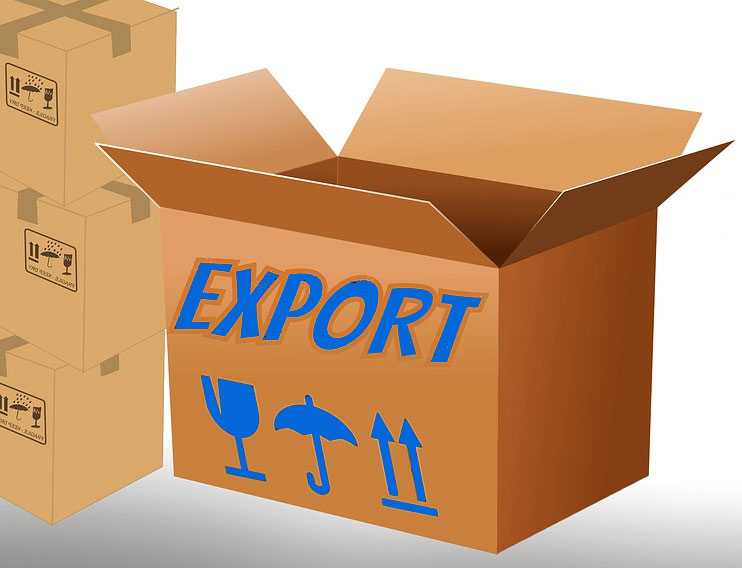
by logisticsplus | Mar 29, 2016 | News
 Exporting can seem like a daunting task to many small- and medium-sized businesses, but it can also be a great way to expand your customer base and grow your sales. Make no mistake, exporting can be a challenge. You have to take the time to select the right product, understand the applicable rules and regulations in both the U.S. and the country to which you are exporting, identify your potential customers, and find out about the different payment and shipping alternatives. Here are some tips for becoming a successful exporter.
Exporting can seem like a daunting task to many small- and medium-sized businesses, but it can also be a great way to expand your customer base and grow your sales. Make no mistake, exporting can be a challenge. You have to take the time to select the right product, understand the applicable rules and regulations in both the U.S. and the country to which you are exporting, identify your potential customers, and find out about the different payment and shipping alternatives. Here are some tips for becoming a successful exporter.
- Identify your potential market. If you’re interested in exporting, you need to identify the right foreign markets for your products. Information is readily available through government agencies and business-related organizations such as foreign trade associations, chambers of commerce, trade commission offices, and development centers (like the SBDC in PA). You can also visit www.export.gov to access a wealth of data that can assist you in identifying overseas markets for U.S. goods. Each foreign market has different trade barriers, import regulations, and technology considerations that may affect your exporting decisions.
- Assess your product potential. A product may be successful in the U.S., but that is no guarantee it will be successful in a foreign market. Preparing a product for export requires not just knowledge of the product, but also an awareness of the many unique characteristics of the market to which you are exporting. Cultural difference and local customs may also require product modifications in areas such as branding, packaging, and labeling. Awareness and sensitivity to these differences are critical to a successful product introduction.
- Know the export controls and licensing requirements. Exporting can expose your business to laws and regulations that you may not be familiar with. Different rules can impact your ability to successfully do business in foreign markets. Violation of these rules can have significant repercussions, including denial of our export privileges and fines.
- Investigate foreign country import controls. Before exporting your product to a foreign market, you need to identify whether the country you’re exporting to has any import controls related to the sale of your product. These can include prohibitions, restrictions, or import licensing requirements. Import documentation requirements and other regulations also vary by country.
- Understand U.S. export laws. As an exporter, you need to determine which federal department or agency has jurisdiction over the item you’re planning to export, and whether or not you will need an export license. The key in determining whether an export license is required for a given product is whether the item has a specific Export Control Classification Number (ECCN).
- Make sense of Incoterms. As an exporter, you need to understand the costs, responsibilities, rights, and obligations that accompany the use of a specific Incoterm. Every quotation or sales order must include a term of sale. If you fail to clearly identify the specific Incoterm to your customer, it can lead to an overestimation or underestimation of the costs associated with the goods you are selling (and ultimately a lost sale).
- Make sure you have the right insurance coverage. You need to understand the amount of insurance on your export transaction and who will be responsible in the event of loss or damage while the goods are in transit. Many freight forwarding companies will provide cargo insurance options to help address these risks.
- Hire a reliable freight forwarder. An international freight forwarder acts as an agent on your behalf and assists in moving your shipment from its U.S. origin to its foreign destination. Capable freight forwarders are familiar with the import rules and regulations of foreign countries, U.S. export regulations, methods of shipping, and required documentation. They can assist you in preparing pricing quotations by providing freight costs, port charges, documentation fees, insurance costs, and handling fees. They can also recommend packaging methods that will best protect your products during transport.
While the above tips are good for every exporter to know, if you work with an experienced and reputable freight forwarder, such as Logistics Plus, you won’t have to deal with too many of the details involved with exporting your goods to a foreign country. We have access to substantial shipping discounts for both international air and international ocean freight services, and our fees are very affordable. We can also provide you with valuable consultation on all aspects of global trade compliance, and we can even help you with financing solutions. Click the button on the left below to request more information, or the button the right to start the export quotation process.






 ERIE, Pa. (April 6, 2016) – Logistics Plus Inc., a worldwide provider of transportation, logistics and supply chain solutions, reports that its
ERIE, Pa. (April 6, 2016) – Logistics Plus Inc., a worldwide provider of transportation, logistics and supply chain solutions, reports that its  The previous bridge had washed away twice within the past three years due to unprecedented flooding that began back in 2013. The new, more permanent bridge was sourced and shipped from a New Jersey, USA bridge builder. The bridge parts moved by container ship to Bombay, and then by train to New Delhi, and then by road to Rishikesh on container lorries. Transshipment by smaller trucks was required for the last leg to Sonprayag. In all, it was a mind boggling logistics exercise carried out to military precision by the LP India team.
The previous bridge had washed away twice within the past three years due to unprecedented flooding that began back in 2013. The new, more permanent bridge was sourced and shipped from a New Jersey, USA bridge builder. The bridge parts moved by container ship to Bombay, and then by train to New Delhi, and then by road to Rishikesh on container lorries. Transshipment by smaller trucks was required for the last leg to Sonprayag. In all, it was a mind boggling logistics exercise carried out to military precision by the LP India team.








